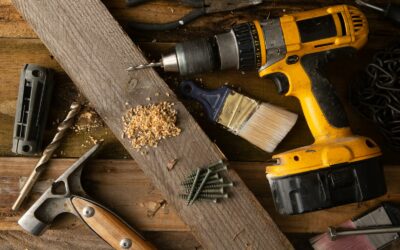Commercial construction is a complex and demanding industry that requires extensive planning, coordination, and expertise. One of the most important aspects of any construction project is having access to the right equipment, and in commercial construction, the vehicles used to transport and move materials are essential.
As experienced experts in commercial construction, we can easily guide you through the complex world of the top 10 types of construction vehicles. We’ll delve into their various uses in our industry, explaining their different functions in a simple, understandable way.
1. Types of Construction Vehicles | Unpacking Excavators
An excavator is a heavy duty machine used in commercial and industrial applications. These types of construction vehicles transport equipment and perform other key tasks, like digging trenches and clearing debris. Their range in sizes caters to various needs.
Compact excavators excel in precision tasks in confined spaces, while large, heavy-duty ones handle substantial commercial projects effectively. Further enhancing their utility, a variety of attachments like buckets, breakers, grapples, and augers enable them to tackle diverse activities, emphasizing their significant role in the success of construction projects.
2.Types of Construction Vehicles | The Bulldozers Role in Commercial Construction
Known for their large metal blades, bulldozers are fundamental to commercial construction projects. They are primarily used for site preparation, including clearing land, grading surfaces, and moving earth. Their design, featuring a wide blade at the front and often a ripper at the rear, allows them to handle diverse terrains and tasks.
Additionally, they efficiently transport large volumes of materials across the site, even in challenging conditions, and are valuable for backfilling trenches. These versatile machines are essential for the smooth execution of construction projects. Their effectiveness in clearing, grading, and moving materials makes them a staple in the commercial construction industry.
3. Types of Construction Vehicles | Understanding Cranes
As indispensable tools within the construction industry, cranes are specially designed for lifting and transporting heavy materials and equipment, their functionality surpassing human capabilities, and those of other machinery.
The typical crane structure, comprised of a tower, a hook, and often a jib, facilitates handling of significant loads. Cranes, particularly tower cranes, play a pivotal role in the construction of tall buildings, capable of reaching heights over 100 meters. Their adaptability is reflected in the multitude of configurations available, including mobile, crawler, and telescopic cranes, each tailored for specific tasks and terrains.
Additionally, they can be fitted with a variety of attachments, such as hooks, buckets, or lift platforms, to augment their functionality, thereby elevating their versatility and efficiency in commercial construction.
4.Types of Construction Vehicles | What are Lifts?
As commercial construction experts, we understand how important it is to have the right equipment for the job. When it comes to lifts, there are a variety of options to choose from depending on the specific needs of your project.
One popular option is the scissor lift, which provides stability and versatility. For reaching higher heights, a boom lift or aerial lift might be the way to go. And don’t forget about the rough terrain scissor lift for outdoor projects.
Each lift has its own unique advantages, so it’s important to work with a team that understands your commercial construction needs. So whether you’re working on a high-rise building or an outdoor construction site, the right lift can make all the difference in getting the job done efficiently and safely.
5.Types of Construction Vehicles | The Role of Concrete Mixers
Vital for any commercial construction job site, a concrete mixer blends cement, aggregate, and water to form and transport concrete. Ranging from portable concrete mixers for smaller tasks to large industrial concrete mixer trucks for larger-scale projects, these types of construction vehicles cater to diverse construction needs.
Compact mixers are preferred for tight spaces and urban projects, while large drum-based mixers handle heavy loads, making them ideal for commercial projects. Various concrete mixer designs, such as traditional drum mixers, pan mixers, non-tilting, and tilting mixers add to their versatility. Their indispensable role lies in their ability to transport and mix concrete, optimizing construction efficiency and productivity.
6.Types of Construction Vehicles | The Importance of Dump Trucks
Dump trucks are vital in commercial construction due to their ability to transport substantial quantities of materials like sand, gravel, or dirt. These construction trucks come in various sizes and configurations, from a small, three-wheeled dump truck for tasks in confined spaces to a heavy duty dump truck for larger haulage needs.
Different types like standard, articulated, or transfer dump trucks cater to specific project requirements, enhancing site efficiency. Beyond transportation, they aid in site preparation and clearance by offloading material swiftly and accurately, critical in project stages. Their diverse roles reinforce their importance in the construction industry.
7. Types of Construction Vehicles | What are Loaders?
Skid steer loaders are a pivotal construction vehicle, known for their compact size and unique maneuvering capabilities. Their small size and “skid” steering mechanism allow them to operate in tight spaces and turn sharply, making them an excellent choice for tasks that require precision in confined areas. A skid steer loader excels in moving and loading materials, such as rocks, dirt, and debris. Their versatile nature allows for various attachments, increasing their utility in commercial construction tasks.
Moreover, their robust design and impressive power make them capable of transporting substantial amounts of material, making skid steer loaders indispensable in both small-scale and large-scale commercial construction projects.
8.Types of Construction Vehicles | Unpacking Pavers
Pavers hold a central role in the heavy construction equipment arsenal, executing the critical task of laying asphalt and concrete on a myriad of surfaces, from roads to parking lots. Their wide range of sizes and configurations allow construction companies to find a suitable paver for all construction tasks.
On one end of the spectrum, compact, handheld pavers offer superior control, and are used for intricate detail work or smaller projects. On the other end, large, self-propelled pavers swiftly and efficiently lay substantial volumes of asphalt or concrete, making them an invaluable asset for large-scale projects. Their ability to meet diverse construction needs embodies their integral role in the construction industry.
9.Types of Construction Vehicles | What are Rollers?
Rollers are essential pieces of heavy equipment, relied upon whenever a smooth, compact surface is the end goal. They are primarily utilized on a diverse array of materials, such as soil, asphalt, and concrete, to produce a level surface.
Rollers come in a broad range of sizes and configurations, reflecting the variety of tasks they are designed to undertake. For minor tasks or projects that require a delicate touch, small handheld rollers offer the ideal solution. Their compact size and easy maneuverability make them perfect for precision tasks, such as smoothing out minor bumps or irregularities in a surface.
On the other end of the spectrum, large, heavy-duty machines are designed to handle challenging tasks and substantial surface areas. These behemoths can compact a vast surface area in a relatively short period, providing an efficient solution for larger projects, such as road construction or airport runway preparation.
Regardless of their size, all rollers share the same fundamental purpose: to create a flat, compact surface that forms the foundation of our built environment, highlighting their indispensable role within the construction industry.
10.Types of Construction Vehicles | What are Telehandlers?
Telehandlers, also known as telescopic handlers, bring a unique blend of capabilities to commercial construction sites, functioning seamlessly as both a crane and a forklift. They are extraordinarily adaptable machines, characterized by their ability to lift, move, and position loads with pinpoint accuracy.
This precision is essential on construction sites, where materials need to be strategically placed without compromising the safety and efficiency of the operation. Even more impressive is their capability to reach heights that are typically inaccessible for standard forklifts. This feature is particularly beneficial in commercial construction scenarios that involve multi-story structures, where the need to transport materials to higher levels is a common task.
The versatility of telehandlers not only simplifies operations, but also significantly expands the range of activities that can be executed, contributing to increased productivity and flexibility in construction operations.
Types of Construction Vehicles on Construction Sites Conclusion
Construction vehicles, with their distinct capabilities and roles, are an integral part of any commercial construction project. These machines, ranging from excavators and bulldozers to cranes and telehandlers, form the top 10 types of construction vehicles utilized in commercial construction. These machines are the unsung heroes that work behind the scenes, ensuring safety, boosting efficiency, and enhancing productivity on construction sites.
Just as a musician relies on his instruments to compose a symphony, the commercial construction industry depends on these powerful machines to create the structures of tomorrow. Investing in the right equipment is not simply a matter of utility, but is essential for ensuring the safety of the workforce and promoting a streamlined workflow. Therefore, if you are contemplating a commercial construction project, it is fundamental to partner with reputable contractors who possess the necessary expertise and have access to the appropriate equipment to guarantee a job well done.
Our commercial construction experts not only have a profound understanding of the different types of construction vehicles and their respective functionalities, but also know how to utilize these tools effectively and safely. With the help of our experts, your commercial construction project will stay on track, meet safety standards, and realize its envisioned purpose.
View Our Work
Brandywine Haverford Estates by Monarch
South Coast Improvement Company has completed interior renovations at the senior living community, Brandywine Haverford Estates by Monarch. We were entrusted with enhancing the facilities, and the results speak for themselves. The team brought diligence and...
Nouveau Marc by Barclay House
South Coast Improvement Company proudly partnering with QSL Management delivered a comprehensive renovation at Nouveau Marc by Barclay House, a premier senior living community. This project focused on revitalizing key resident areas with an emphasis on safety,...

















